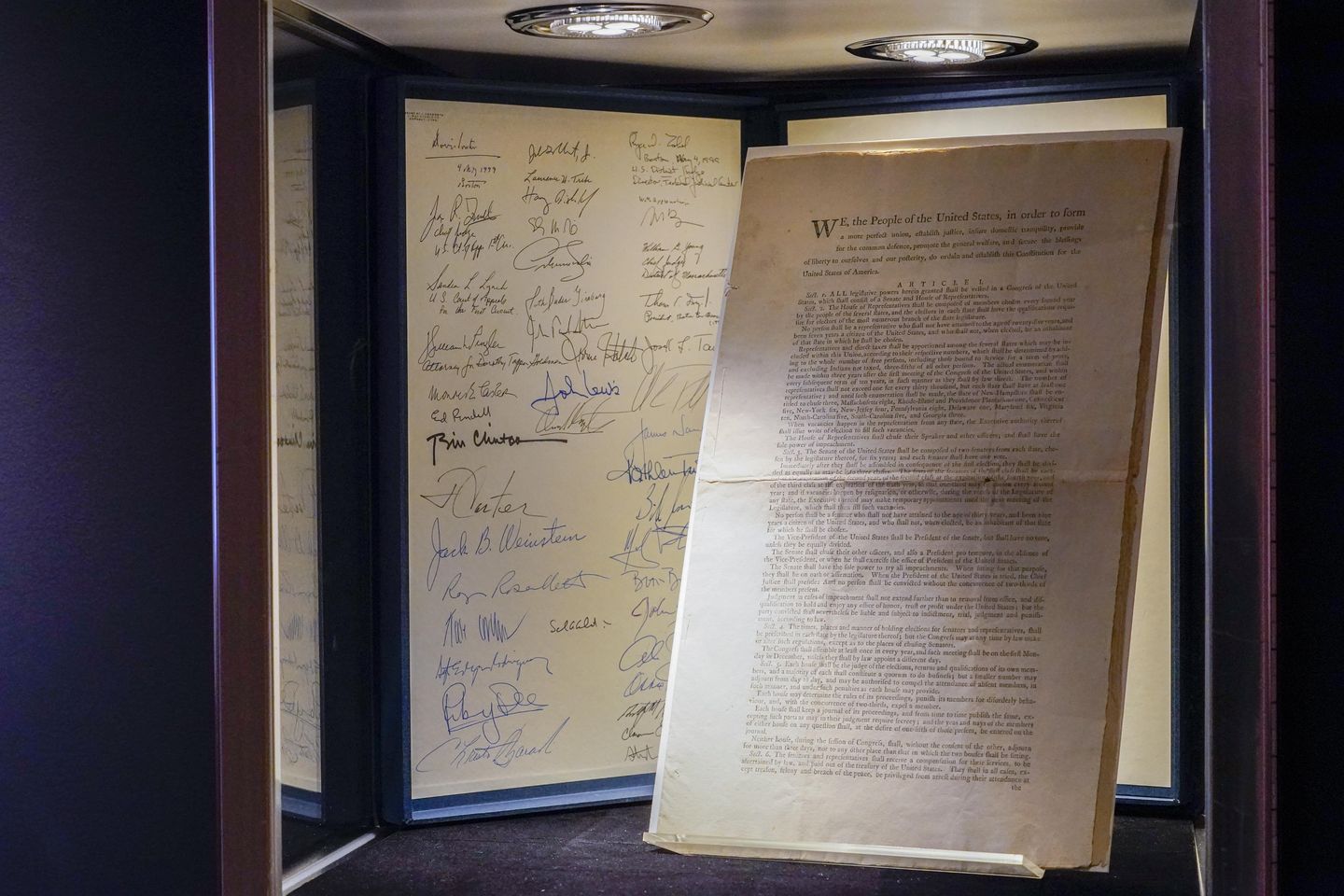
President Trump’s sweeping policy changes on topics ranging from the economy to government spending have inspired Americans to learn more about their rights, according to an annual Constitution Day civics survey.
In an online poll of 1,684 adults published Thursday, the University of Pennsylvania’s Annenberg Public Policy Center found that 40% correctly named three of their five First Amendment rights, up from 30% last year.
That included 48% who knew that the Constitution guarantees their freedom of religion, up from 39% in 2024. Awareness of free speech increased from 74% to 79%, and knowledge of the right to assemble jumped from 27% to 36% over the same period.
Matt Levendusky, a Penn political scientist and Annenberg researcher, said the numbers reverse years of decline and evoke a similar surge of awareness that flared up in 2018 during Mr. Trump’s first term.
“When politics is more immediately in the news, and more relevant to people’s lives, they pay more attention and have higher levels of knowledge,” Mr. Levendusky said in an email.
He cited lower courts blocking Trump policies, the Supreme Court’s recent decision to expedite a hearing on the legality of the president’s tariffs, Congress passing the One Big Beautiful Bill and Mr. Trump’s memorable sound bites as examples.
The Trump White House applauded the survey’s conclusions in a statement to The Washington Times.
“President Trump is a fearless defender of our Constitution, and his landslide victory on November 5th has ignited a wave of patriotism and civic engagement across our country,” said Liz Huston, a White House spokeswoman.
Falling on Sept. 17 each year, Constitution Day is a federal holiday that honors the 1787 signing of the nation’s written charter and those who have become U.S. citizens.
Reached for comment, several historians and political analysts critical of the president agreed that Americans have tuned into the founding document more than usual since he returned to office in January.
“People don’t treasure a right until they think they may not have it anymore,” said James Carville, a Democratic Party strategist and former political science lecturer at Tulane University. “Trump always claims he never gets enough credit for anything, but we can now say pretty definitely that he’s the greatest civics teacher in modern America.”
“Trust Trump to teach us to appreciate our fragile civil liberties,” added Woody Holton, a University of South Carolina historian of the Revolutionary War.
Sarah Weicksel, executive director of the American Historical Association, said the findings call on the Trump administration to reconsider its cuts to federal education funding as teachers clamor for resources to keep up with its policy battles.
“This administration prides itself on challenging political and constitutional norms,” Ms. Weicksel added. “Every day, the national news brings lessons on checks and balances, the rule of law, and the rights of individual Americans.”
The Annenberg Public Policy Center conducted this year’s nationally representative panel survey in August. It had a margin of error of plus or minus 3.5 percentage points at the 95% confidence level.
The survey also found that 70% of adults could list all three branches — the legislative, judicial and executive — of the government.
That’s up from 65% in 2024 and the highest the Annenberg survey has recorded in years.
Political scientists, legal scholars and historians have warned for years that a growing apathy toward basic government functions could destabilize the nation politically.
Peter Wood, president of the conservative National Association of Scholars, said it’s still disturbing that 30% of adults remained ignorant of the government’s three branches in the latest Annenberg survey.
“Trump’s influence on this, I suspect, is that he has made civics interesting,” said Mr. Wood, a former associate provost at Boston University. “Whether the poll respondents were moved by enthusiasm for his policy initiatives or by opposition to them, they have new reason to pay attention.”
Annenberg first conducted the survey in 2006. It also found that this year 34% correctly named freedom of the press and 12% identified the right to petition as the other two First Amendment freedoms, statistically unchanged from 2024.
According to Annenberg scholars, political affiliation played no difference in this year’s modest knowledge gains.
But the survey found stark political divisions surrounding the Supreme Court. There was a nearly 60-point gap between the 75% of Republicans and 18% of Democrats who expressed at least moderate trust in the conservative-led high court.
Elesha Coffman, a cultural historian at Baylor University who was not involved in the survey, said such findings reveal “an alarm bell ringing” in people’s sudden interest in civics.
“I see both distress and hope in these survey results,” she said in an email, reflecting views on the Supreme Court.
This year’s findings are a sharp turnaround from September 2024, when the last Annenberg survey warned of widespread political ignorance heading into November’s presidential election.
Kathleen Hall Jamieson, director of the Annenberg Public Policy Center, predicted that civics knowledge will continue rising as Mr. Trump’s executive branch jostles with Congress and the Supreme Court for authority over economic policy.
“When the prerogatives of the branches are at issue, as they are over whether tariff authority resides with the president or Congress, we expect increased awareness as well,” Ms. Jamieson said.











